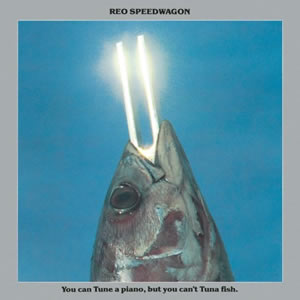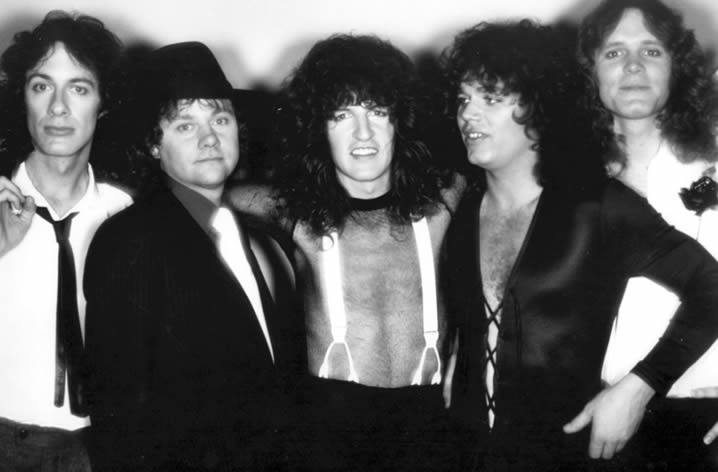You Can Tune a Piano but Not a Fish
Buy You Can Tune a Piano but You Can't Tuna Fish
 Often derided for its ludicrous title and album cover, You Can Tune a Piano, but You Can't Tuna Fish was nonetheless the most important benchmark for REO Speedwagon. Released in 1978, this was the seventh studio album by the Illinois-based rock band who had worked relentlessly throughout the decade but, prior to this record, failed to make the Top 40. You Can Tune a Piano, but You Can't Tuna Fish peaked at number 29 and went on to achieve double platinum status in the US.
Often derided for its ludicrous title and album cover, You Can Tune a Piano, but You Can't Tuna Fish was nonetheless the most important benchmark for REO Speedwagon. Released in 1978, this was the seventh studio album by the Illinois-based rock band who had worked relentlessly throughout the decade but, prior to this record, failed to make the Top 40. You Can Tune a Piano, but You Can't Tuna Fish peaked at number 29 and went on to achieve double platinum status in the US.
Named after a classic flat bed truck, REO Speedwagon was formed in 1967 at the University of Illinois in Champaign by keyboardist Neal Doughty and drummer Alan Gratzer as a cover band playing in campus bars, fraternity parties, and university events. After several lineup shifts, guitarist Gary Richrath joined in late 1970 and the regional popularity of the band grew tremendously, leading to a deal with Epic Records and the band's self-titled debut album in 1971. The group twice replaced lead singers before Kevin Cronin permanently joined the group in January 1976. The following year, the group released a live album and relocated to Los Angeles.
Recording of You Can Tune a Piano but You Can't Tuna Fish took place in Illinois and California in late 1977 and early 1978. This album was the first to feature bassist Bruce Hall and it was co-produced by Cronin and Richrath along with Paul Grupp and John Boylan.
 You Can Tune a Piano but You Can't Tuna Fish by REO Speedwagon | |
|---|---|
| Released: March 16, 1978 (Epic) Produced by: Kevin Cronin, Gary Richrath, Paul Grupp, & John Boylan Recorded: Record Plant Studios, Los Angeles & Paragon Recording Studios, Chicago, 1977-1978 | |
| Side One | Side Two |
| Roll with the Changes Time for Me to Fly Runnin' Blind Blazin' Your Own Trail Again Sing to Me | Lucky for You Do You Know Where Your Woman Is Tonight? The Unidentified Flying Tuna Trot Say You Love Me or Say Goodnight |
| Group Musicians | |
| Kevin Cronin – Lead Vocals, Guitars, Keyboards Gary Richrath – Guitars Neal Doughty – Keyboards Bruce Hall – Bass, Vocals Alan Gratzer – Drums, Vocals | |
The album launches with "Roll with the Changes", a piano-based rocker by Cronin which would soon go on to become a classic rock staple. Richrath's heavy, whining guitar is accented throughout with Dougherty taking his turn with a Hammond organ lead and a rich backing chorus belting out the catchy counter hook. The album's other anchor comes next with "Time for Me to Fly", a classic breakup song that is built like an early prototype for some of the better eighties power ballads which would come later. Built on the pleasant musical combo of Cronin's 12-string acoustic and Dougherty's Moog synthesizer along with fine melodic, vocals and a harmonized double bridge, which bookmarks the slight guitar lead. While both of these tracks would go on to be classics, they did not receive initial pop notoriety as both failed to chart in the Top 40.
Richrath's first composition, "Runnin' Blind", was co-written by Debbie Mackron and is highlighted by a pure, thick guitar sound. "Blazin' Your Own Trail Again" is another acoustic ballad with some heavier elements added on top for a harder rock effect and high pop accessibility. The original first side concludes with Richrath's short but heavy "Sing to Me".

Side two is filled with hard rock material and is anchored by a couple of tracks with extended jams. Although lyrically weak, "Lucky for You" is musically supreme with some excellent bass by Hall as well as later harmonized lead guitars which sheppard in the extended jams of the second half of track. After the Southern rock tinged "Do You Know Where Your Woman Is Tonight?" and the filler instrumental "The Unidentified Flying Tuna Trot", comes the closer "Say You Love Me or Say Goodnight" a strong, pure rocker highlighted by Dougherty's piano lead and guest Lon Price's intermittent saxophone licks.
You Can Tune a Piano but You Can't Tuna Fish set the stage for super-stardom during the 1980s, starting with Hi Infidelity in late 1980. REO Speedwagon also started to morph from hard rock to more pop-oriented and ballad-centric material as the new decade unfolded.
~
Part of Classic Rock Review's celebration of 1978 albums.

You Can Tune a Piano but Not a Fish
Source: https://www.classicrockreview.com/2018/03/1978-reo-speedwagon-tune-piano/
0 Response to "You Can Tune a Piano but Not a Fish"
Post a Comment